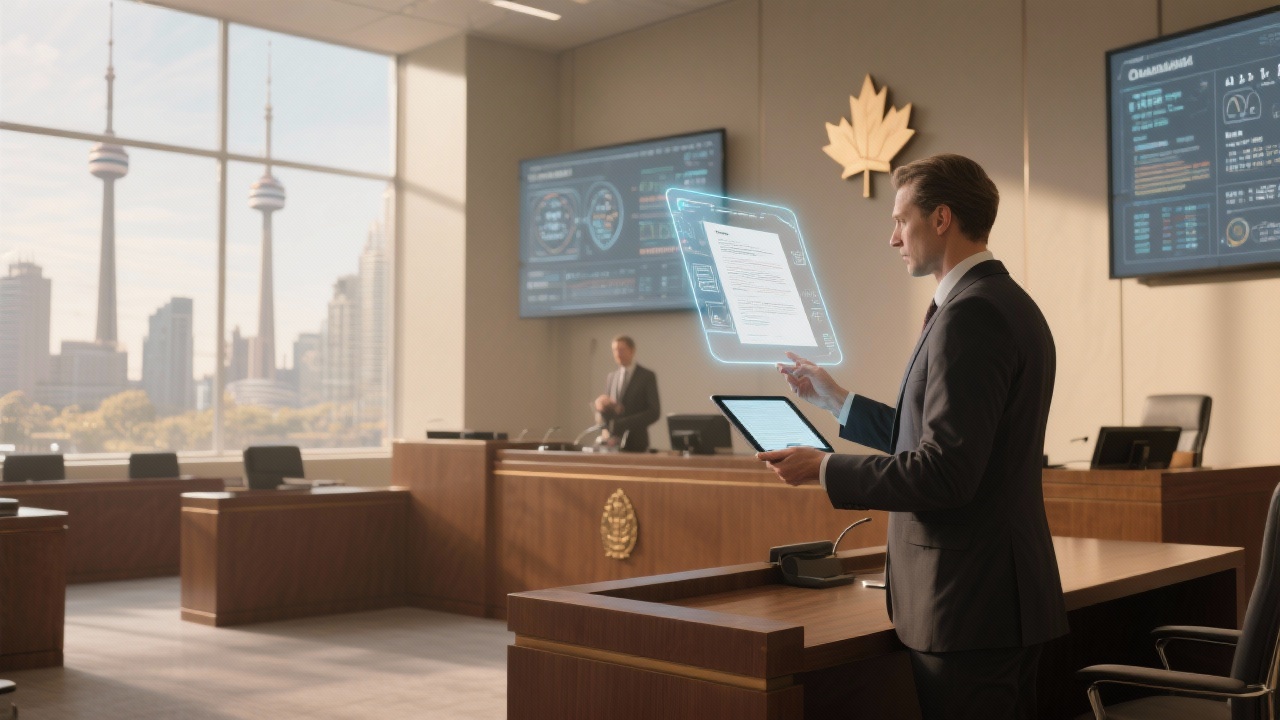AI and the Future of Litigation
Ontario’s proposed amendments to the Rules of Civil Procedure mark one of the most significant changes in decades. The traditional Examinations for Discovery process, long considered the backbone of pre-trial preparation, is being replaced by a front-loaded, paper-based system emphasizing early disclosure, written advocacy, and limited oral evidence.
Under this evolving system, lawyers will now be required to:
- Disclose all relevant documents early in the process
- Exchange witness affidavits instead of discovery transcripts
- Limit in-person testimony to the parties themselves
This transformation demands more preparation, precision, and persuasive writing than ever before, and it’s where AI-driven legal tools like Case Polaris become indispensable for maintaining a competitive advantage.

Case Study: TechNova Inc. v. BlueCore Solutions Ltd.
A fictional but realistic case, TechNova Inc. v. BlueCore Solutions Ltd., illustrates how AI can be used to navigate this new litigation model effectively.
TechNova, a Toronto-based software company, entered into email negotiations with BlueCore, an energy technology firm. After a series of exchanges, including a detailed licensing proposal and a confirming “Looks good. Let’s move forward” from BlueCore TechNova, the company shared its source code. BlueCore then integrated the code into its platform and began commercial distribution, but later denied that a binding agreement existed due to the absence of a formal contract.
TechNova sued for breach of contract and unjust enrichment — and AI proved crucial in building both arguments.
Building a Stronger Case with AI-Driven Legal Research
AI-powered tools like Case Polaris streamline legal research by identifying key precedents, summarizing judgments, and comparing similar cases, capabilities vital in early-disclosure litigation.
In TechNova, the AI retrieved and summarized precedent establishing that:
- Informal agreements through email and conduct can form binding contracts
- Consideration and mutual intent can be inferred from the exchange of goods or services
- Courts recognize enforceability even without signed documentation
With Case Polaris’s Case Summarization and Comprehensive Legal Library, lawyers can perform similar analysis within minutes, saving hours of manual review and ensuring every claim is backed by verified legal authority.
Unjust Enrichment: Strengthening Alternative Claims
Should the court find no valid contract, AI can also assist in formulating a compelling unjust enrichment argument. In TechNova, the AI identified case law confirming that:
- Enrichment without payment or consent constitutes an unjust benefit
- Juristic defenses are invalid when a defendant simultaneously disputes a contract’s existence
- Plaintiffs deprived of financial or proprietary value can claim restitution
By leveraging Case Polaris’s Document Upload & Analysis, lawyers can upload case documents, automatically detect relevant enrichment factors, and cross-check them with precedents, reducing the time needed to prepare persuasive alternative arguments.
Why AI Is Essential in Ontario’s New Litigation Framework
The 2026 amendments shift the focus from reactive litigation to proactive strategy. Without oral discovery, written affidavits, document analysis, and early argumentation take center stage.
AI tools like Case Polaris enable:
- Instant research into relevant case law and precedents
- Automated document review for evidence disclosure
- Predictive insights on litigation outcomes
- Secure client data handling, ensuring compliance with privacy standards through Secure & Confidential AI models
In essence, AI has become a litigation partner, not just a research assistant.

Conclusion: The Competitive Edge of AI-Integrated Litigation
Ontario’s legal landscape is evolving toward efficiency, precision, and accountability. The TechNova case demonstrates how AI transforms legal strategy by merging smart research with data-driven insights.
As civil procedure shifts toward written advocacy and early evidence exchange, firms that embrace legal AI platforms like Case Polaris will gain a decisive edge, improving accuracy, reducing preparation time, and staying ahead of procedural reforms.
In the age of AI-enhanced litigation, the question isn’t whether to adapt it’s how fast.
Source: LexisNexis Canada
Share :
